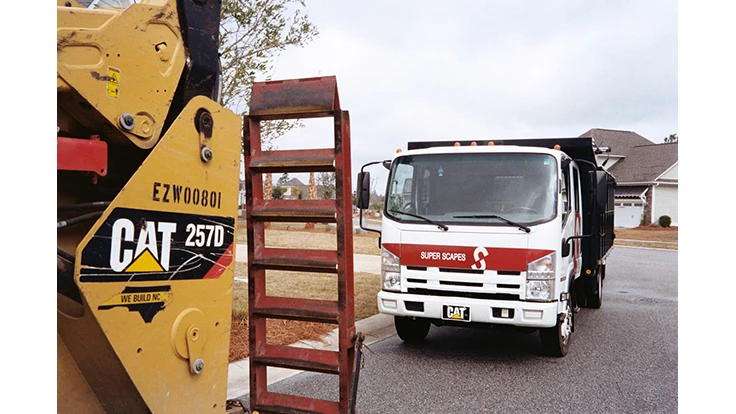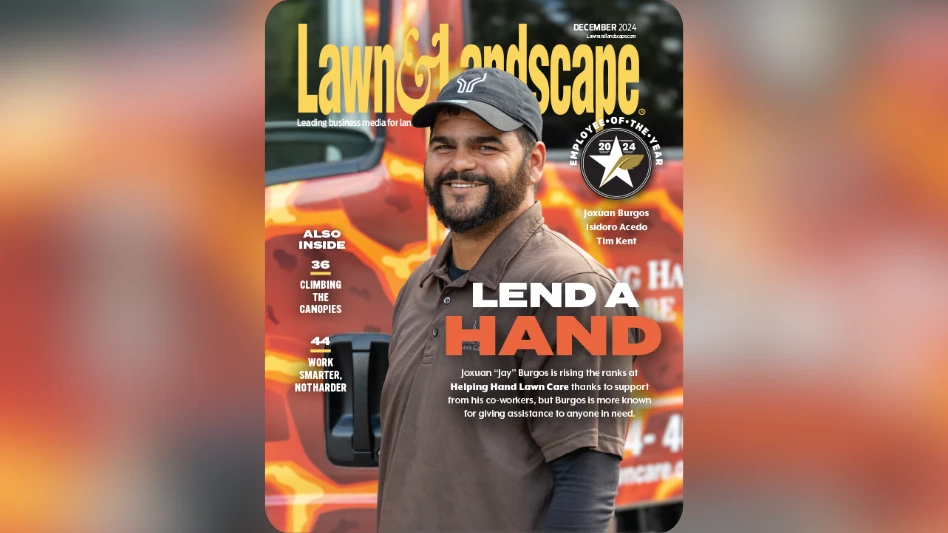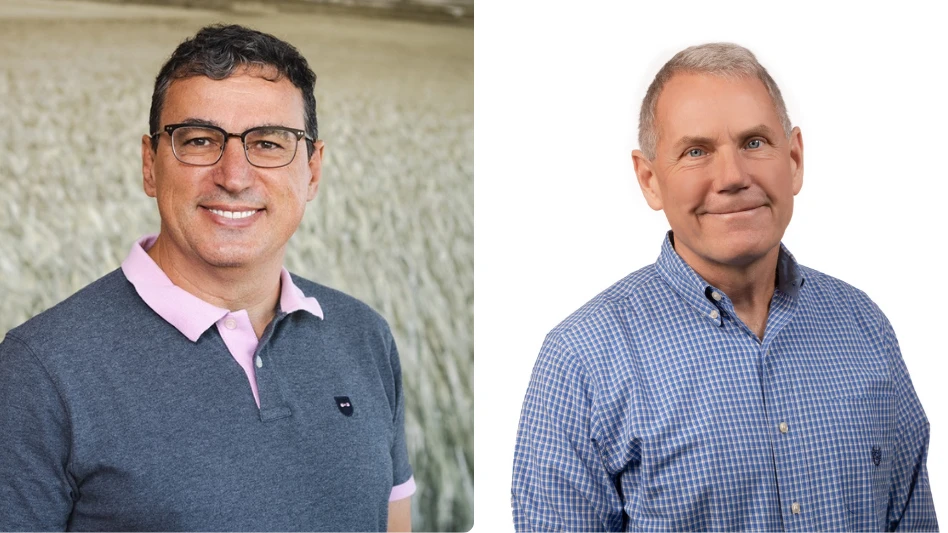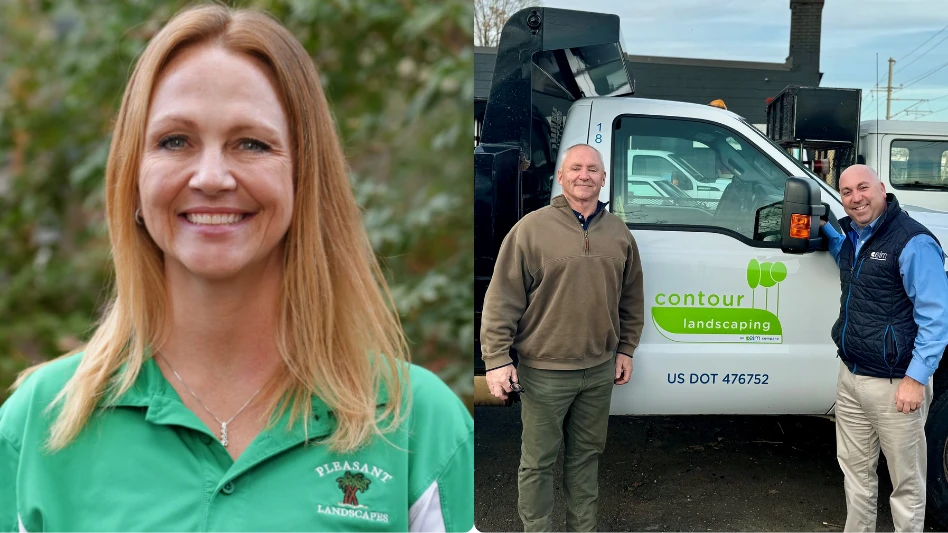
SuperScapes crews have nothing to do with zero-turn mowers, edgers or routine grass-cutting visits to customer accounts. At this 100-percent design/build firm in Wilmington, North Carolina, the bulk of the business is new construction installations for a couple of national builders.
“Even in the worst of times, those guys still build,” says Dane Milligan, president, relating that his complete dedication to the construction side of the green industry is a rarity. Most design/build firms pick up some maintenance for the recurring revenue.
Not SuperScapes.
“Honestly, I used to do maintenance and I never had my heart broken so much,” Milligan says. “We felt like we gave so much energy and effort to maintain a property and no one was ever happy. I’d walk the properties, and they’d look good. Then we’d get an email or phone call at 9 p.m. about one weed in a bed.”
Competing in the landscape maintenance arena got too tough for a smaller firm, he says.
SuperScapes employs 22 people and did $2.5 million last year. The company is growing, on pace to break $3 million in 2017 and in March, Milligan checked out his backlog and it was well into summer. Wilmington’s new construction market shows no sign of slowing down, Milligan says, noting that the last few years have been particularly strong.
Most of SuperScapes installation business is focused on new construction – those couple of nationals including D.R. Horton and Pulte, along with a range of “semi-custom” builders that deliver higher profit margins, Milligan says.
“It’s a good balance for us because we get stability with installation from the national builders, and our semi-customer builds are very profitable,” he notes.
The only maintenance SuperScapes performs on some model homes. And Milligan intends to keep the business this way, diversifying with the installation services – hardscape, retaining walls, irrigation systems, site solutions and grading.
“I have more of a construction mindset than a horticultural mindset,” says Mulligan, relating why he prefers this side of the green industry. Growing up on a farm and helping in the field, he loved being outdoors but realized he was a builder. (His parents wanted him to become an attorney or doctor, but wearing a suit or white coat just wasn’t a fit.)
“Farming is real seasonal, so my dad always landscaped and I originally started the business with him,” Milligan says of the early days. By 2008, the venture his dad helped him get started had grown large enough with a few employees that Milligan took it over and the business became SuperScapes.
Today, SuperScapes is in a mode of streamlining to improve efficiency, creating systems so it can reduce costs and continue its total design/build focus, and honing a team that can support its continued growth.
Streamlining operations.
You have to spend money to make money. That’s the reality with materials-intensive work where cash outlay for plants, soil, mulch, hardscape, irrigation parts and more requires an investment before invoicing. Milligan learned the hard way with a significant commercial installation job back in 2010 that he estimated at a tight margin to win the bid.
“We ended up getting paid only a portion of that,” he says bluntly.
Materials were acquired, but not only was the pay slow it never came in to compensate for the job. Milligan notes that since this time, North Carolina has put regulations in place to protect contractors more so than ever. As long as lien waivers are properly filed, regulations now put vendors ahead in the lien process. That way, if a developer is not paying on time or in full, those vendors are compensated for materials first. This benefits contractors like SuperScapes because while they must still collect for their labor, they are not responsible for materials costs. (This also saves relationships with vendors, who might not want to extend their usual deals or work with contractors who default—even if it’s the developer’s fault.)
“We went back to residential installation jobs where I could get paid every week or couple of weeks, so the cash flow was fine,” Milligan says, relating that the business has mostly stayed away from commercial after this experience. (“Now the contractors are more protected, so we are venturing out,” he adds.)
What Milligan ultimately learned is that any way he can streamline the business is beneficial for cash flow. He’s focused on: volume purchasing to save time and money on materials; capturing unbillable hours by reducing wasteful shop time; improving routing; and automating as much of the business as possible.
Materials matter: Projects are designed a couple months in advance using software that allows Milligan to do accurate field take-offs from the office without wasting man-hours in the field. Because of the advance planning, materials for several jobs can be purchased in bulk to save cost.
“We save a percentage, and we can load the truck with materials on site and we don’t have to wait on materials to finish jobs,” he says.
Shop time: With 20-plus employees on installation job sites daily, the gathering of materials and equipment at the shop could seriously eat up billable hours. Staggering the start of the workday helps. Five foremen arrive 30 minutes early to load trucks. “That saves time vs. having 20 heads starting here and only five working,” Milligan says.
Better routing: With a 100-percent design/install business, routing is still crucial. “It’s different than maintenance or lawn care, but we try to have two or three houses ready to install in the same neighborhood at the same time so we can eliminate windshield time,” Milligan says.
Milligan analyzed the numbers and figured out that by doing the same exact jobs on one street vs. driving across town, he can save $6,000 to $8,000. “That’s the different in sales if jobs are lined up right, and we are taking apples-to-apples by just the jobs being grouped together and ready to install,” he says. (This includes materials being on hand.)
Automating the business: Industry software like dynaSCAPE has helped SuperScapes save time by doing measurements and designs in the office rather than eating up hours in the field. Milligan says the business is looking to shift toward LMN software for estimating. But what you put into these software programs dictates how effective they are. Milligan says he took a good look at the bottom line, overhead, materials – and warranty costs. “We figured out our break-even point and we know how efficient we need to be to hit our profit margin,” he says.
Milligan says the team is focused on hitting a certain dollar amount per crew, per week. Linking crew efficiency to dollars helps the team understand how their production fits into the overall success of the company.
Developing a valuable team.
Finding people is a perennial challenge in the landscape industry, Milligan acknowledges. But having account managers who connect with field personnel has been critical. Rigo Hernandez is one, and he came from a high-end residential design/build firm and brought knowledge of quality-crafted work to SuperScapes, Milligan says.
“He knows what quality should look like,” Milligan says, relating how this has impacted the way they estimate man-hours. Milligan tends to estimate with efficiency in mind, while Hernandez has a mind for detail. “He has created a great balance because he has that high-end mindset and I mix in the production mindset,” he says.
Also, Hernandez speaks Spanish and has created important relationships with crewmembers as a go-to and the Hispanic community, Milligan adds. “Everyone talks about how labor is the hardest thing, but Rigo can communicate with our guys and he plays soccer with them on weekends,” he relates. “He tells his friends, ‘I enjoy working here, they are honest, everyone gets paid on time, if there is an issue I work it out,’ and that has really filled a gap on our team.”
Meanwhile, Milligan brought on his brother, Hunter, as an account manager with some turf experience from working on the family sod farm. But he had not worked in landscape before. “We developed him,” Milligan says.
Hunter Milligan worked in the warranty area of the business for about two years. “Instead of making him a foreman right away, we put him in warranty and said, ‘We want you to see every single problem we have, that we encounter and that we create,’” he says. “Not all warranty issues are clients’ faults. Sometimes it’s our negligence.”
This perspective gave Hunter valuable knowledge for improving production and quality processes in the field once he became a foremen, and now account manager.
As for Milligan, his role today is strictly estimating and some scheduling. “Our goal this year is for the company to be as automated as possible by 2018 so I can start stepping back in and building the commercial side of the business,” he says, relating that with an eye on the numbers and efficiency, the company will be better prepared to successfully manage large-scale design/install jobs.
“I’ve been doing design/build for a long time, and commercial work is piquing my interested again,” Milligan says. “I think it will open up new doors and new challenges for us, and that always leads to more innovation.”
Latest from Lawn & Landscape
- LawnPro Partners acquires Ohio's Meehan’s Lawn Service
- Landscape Workshop acquires 2 companies in Florida
- How to use ChatGPT to enhance daily operations
- NCNLA names Oskey as executive vice president
- Wise and willing
- Case provides Metallica's James Hetfield his specially designed CTL
- Lend a hand
- What you missed this week





